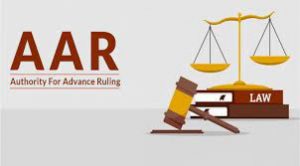 The West Bengal Authority for Advance Rulings in the case of M/s. Prinsep Association of Apartment Owners vide Order No. No.- WBAAR 21 of 2023 and Order Number 22/WBAAR/2023-24 dated 29.11.2023, held the amount collected by the applicant from its members for setting up a sinking fund is an advance payment towards future supply of services and the applicant is, therefore, liable to pay tax on such supply.
The West Bengal Authority for Advance Rulings in the case of M/s. Prinsep Association of Apartment Owners vide Order No. No.- WBAAR 21 of 2023 and Order Number 22/WBAAR/2023-24 dated 29.11.2023, held the amount collected by the applicant from its members for setting up a sinking fund is an advance payment towards future supply of services and the applicant is, therefore, liable to pay tax on such supply.
In this case, the applicant is an registered Association of Persons (AOP) whose primary functions are (i) to raise funds; (ii) to provide for maintenance, repair and replacement of the common areas and facilities of the property and payments thereof; (iii) to provide for proper maintenance of accounts; (iv) to provide for and do any other thing for the administration of the property in accordance with the Act and bye-laws.
The Applicant Sought Advance rulings on the following questions:
(i) Whether monthly contribution charged from the member over and above Rs. 7,500/-, tax would be charged or the entire amount collected from members is exigible to tax under Notification No. 12/2017 dated 28.06.2017.
(ii) Whether the amounts collected from members for setting corpus fund for future contingencies/ major CAPEX in addition to regular maintenance charged would be covered under the definition of supply and liable to be taxed.
(iii) Whether collection of common area electricity charges from the members when the same is recovered on actual basis would be taxable under GST.
The Authority for Advance Rulings held in the following manner:
(1) Taxability of monthly contribution charged from the member over and above Rs. 7,500/-: The Government intends to provide the exemption only in cases where contribution received from a member per month is below the specified limit of Rs. 7500/-. In other words, where the contribution exceeds the limit, taxability of such services by RWA shall not get covered by entry number 77 of the aforesaid notification. We are, therefore, unable to accept the contention of the applicant that in the event of the monthly contribution charged to a member exceeding Rs. 7,500/- per month, tax is payable only on the differential amount.
(2) Liability of GST on the amounts collected for corpus fund from members: A sinking fund is created in order to meet future contingencies e.g., to meet the expenses for structural repairing, reconstruction work etc. RWA creates a sinking fund which serves as a backup fund for supply of specific services. A member contributes to the sinking fund with an agreed condition that the RWA will provide some specific services in future, as and when required out of the said fund – the amount collected by the applicant from its members towards sinking fund is only meant for meeting expenses for future supply of services and therefore such contribution cannot qualify as a deposit – thus it is held that the amount collected by the applicant from its members for setting up a sinking fund is an advance payment towards future supply of services and such payment comes under the definition of ‘consideration’ under clause (31) of section 2 of the GST Act. The applicant is, therefore, liable to pay tax on such supply in terms of sub-section (2) of section 13 of the GST Act. It would be pertinent to mention here that we are not in agreement with the view expressed by the officer concerned from the revenue on this issue.
(3) Liability to pay CGST/ SGST on collection of common area electricity charges from the members when the same is recovered on actual basis: The applicant collects the electricity charges consumed for common area from its members on pro-rata basis. In course of hearing, the authorized representative of the applicant has furnished copy of one tax invoice in support of ‘Common Area Maintenance’ issued to a member – electricity is being supplied bundled with supply of goods and services sourcing from a third person for the common use of its members. Thus supply of electricity forms a part of composite supply where the principal supply is the supply of common area maintenance services. The applicant is therefore liable to pay tax on collection of common area electricity charges if the services for common area maintenance fails to qualify for exemption under serial number 77 of the Notification No. 12/2017-Central Tax (Rate) dated 28.06.2017, as amended and as discussed earlier.



